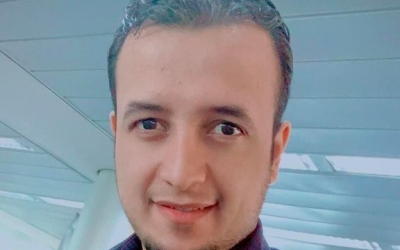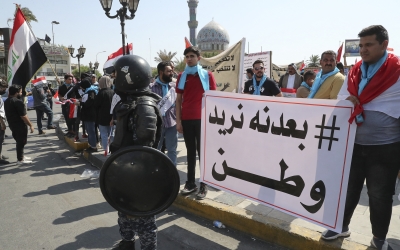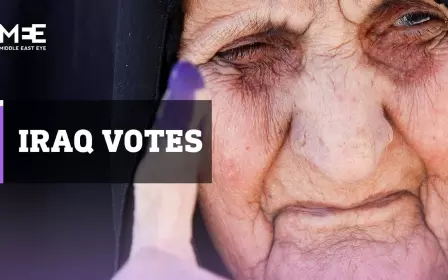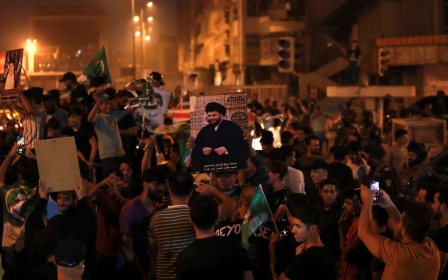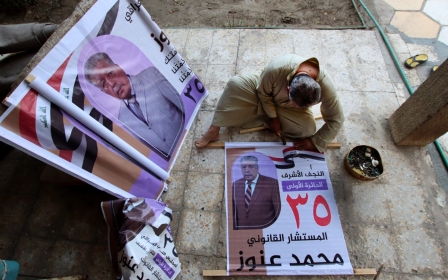Iraq elections 2021: Disenchanted non-voters make up biggest constituency
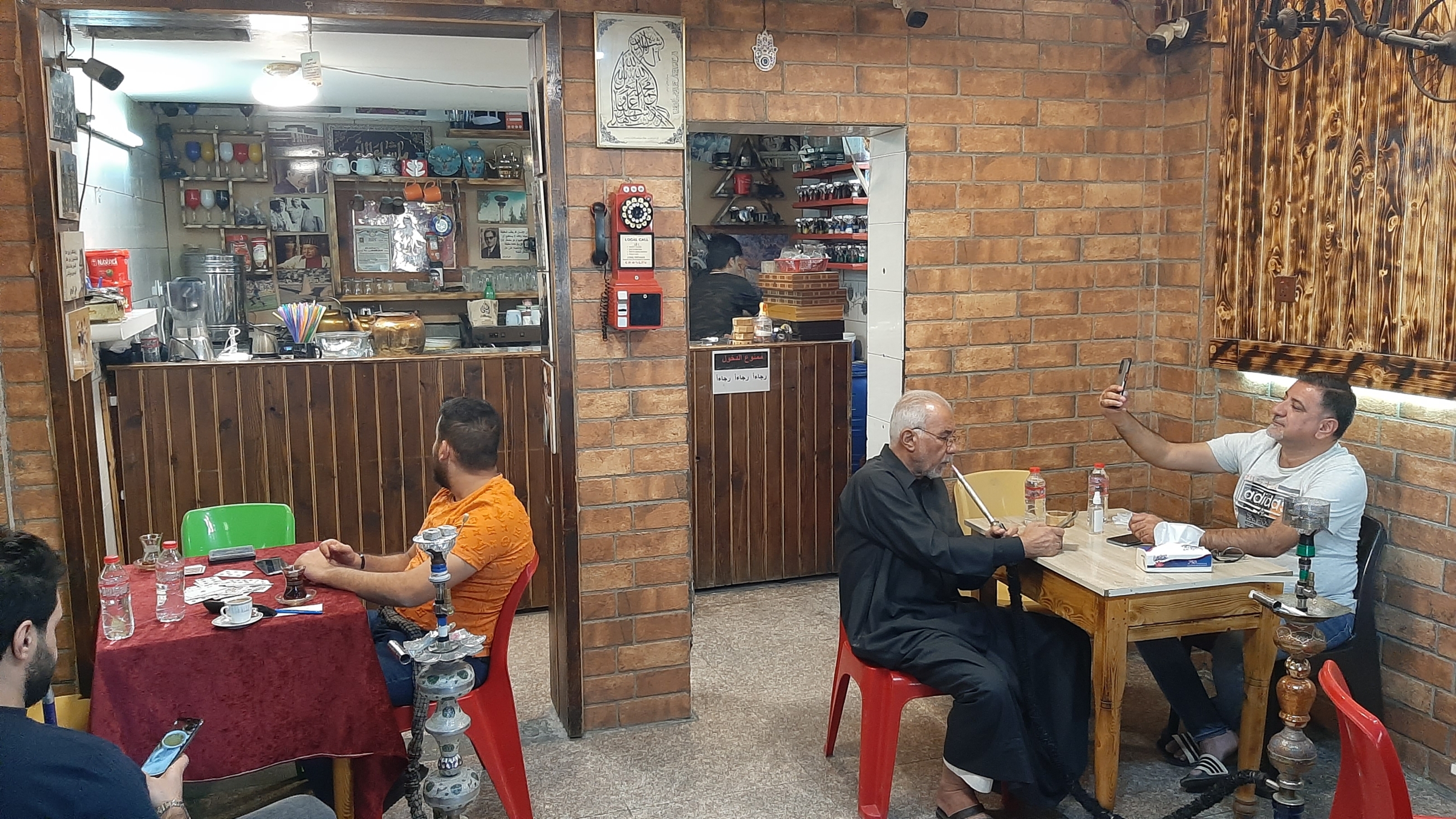
Many people turned out on Sunday to take part in Iraq's fifth election since the overthrow of former ruler Saddam Hussein by US forces in 2003.
However, with early participation results emerging, it seems that the majority of the country chose to stay at home.
In a cafe in Baghdad's central Karrada district, one group of men decided that playing cards, smoking shisha and drinking coffee was a better use of their time than taking part in what they saw as a corrupt and useless political process.
'The country is sold, there's no-one to vote for. This country's on its way to hell'
- Murtada, medical student
While the walls of Karrada were covered with posters and banners urging customers to support the likes of the State of Law, Taqaddum or Fatah coalitions, or any number of political parties, the men in the cafe are arguably representative of the biggest constituency in Iraq - non-voters.
"I threw away my election card," Murtada, a young medical student, told Middle East Eye. "The country is sold, there's no-one to vote for. This country's on its way to hell."
A number of his friends, he added, had gone to the polling stations to "sell their votes" for around 50,000 or 100,000 dinars ($35 to $70) a go, deciding it was worth more to them not to starve than vote in a hopeless election.
At his age, he had been eligible to vote twice, but said he had never taken up the opportunity. Without the right connections, he had no expectation of being able to get a job after graduation.
"You make the effort, you study, but in the end you get nothing."
Murtada added that there was always the option to become a soldier if he paid the right bribe, meaning "you pay $10,000 to become a soldier, and then you die because an IED explodes or some militias kills you".
As he spoke, a United Nations van sped past the cafe. Officials from the international body have been out and about on polling day, monitoring the voting.
Officials say scores of people have already been arrested across Iraq for violations related to the elections, while technical failures led to stoppages at dozens of polling stations.
However, even if the elections turned out to be exemplary and free from technical issues or vote rigging, the problem lies in the actual options on offer.
'It's chaos now'
Karrada's main street is a cornucopia of cafes, upmarket clothes shops and trendy coffee houses, as well as a smattering of kebab shops and restaurants selling other traditional Iraqi food.
The rejuvenation of the area belies the fact that it was the location of Iraq's worst ever single terror attack, when a series of coordinated bombings claimed by the Islamic State (IS) group killed as many as 340 people in July 2016.
Now, a combination of a vastly improved security apparatus and the defeat of IS as a military force means that car bombs, once commonplace, are now effectively non-existent.
With the threat of IS largely gone, at least in the south of the country, the focus of ordinary people has returned to domestic political issues and the influence of often Iran-backed militias that are able to operate with impunity across Iraq.
Amir Jassem said he has voted only once since 2003, casting his ballot for former prime minister Iyad al-Allawi's party in 2005, at a time when polling stations were regularly bombed and shot up. He has vowed not to vote again until Iraq has a rule of law.
He said he had been discussing the problem with a friend recently.
"I told him: 'Look, once I have a problem with a tribe or one of the militias and the problem gets solved in court - then I will vote,'" he said.
Jassem saw no point in participating in the democratic process so long as powerful tribal and armed groups continue to be above the law.
"It's chaos now," he told MEE.
'They are all bad people'
Not everyone in the cafe boycotted the election. One man, Saad al-Quraishi, who emphasised that his last name marked him as a descendant of the Prophet Muhammad, told MEE he had voted for the State of Law coalition, a political grouping led by former prime minister Nouri al-Maliki.
"Since 2003, I have always voted for the Dawa Party," he said, referring to the long-established Islamist party that is part of the State of Law coalition.
Laughing, he said that he had "herded" his friends and family to vote for the same candidates.
"Some of my friends did not vote because the candidates did not manage to win their trust," he nonetheless conceded.
Despite his engagement with the political process, Quraishi helped corral a number of the cafe's non-voters into being interviewed.
One of them, Abdullah Mohammed, said the country and its political parties were caught in the grip of foreign powers, an allegation, coincidentally, often levelled at Maliki and his allies.
"They are useless. In past elections, we voted and nothing changed," said Mohammed, adding that the last time he voted he had spoiled his ballot anyway.
"They are all bad people."
Mohammed is in his third year studying business administration at university, while also running a sidewalk burger stall, but he doesn't expect that his studies will lead to much.
"I will not get anything out of my degree because I am not affiliated with these countries" the Iraqi government is allegedly beholden to, he said.
In an ideal world, Mohammed said, he would like to become a public servant and "serve the country," a career path many young Iraqis aspire to, in part due to the relatively high salaries and job security.
Quraishi stepped in at this point to add that Mohammed was a Sunni Muslim, implying that he would have limited opportunities as a result of the sectarianism that still holds sway in much of Iraq.
Does Mohammed ever see the country improving?
"Never," he said.
Middle East Eye propose une couverture et une analyse indépendantes et incomparables du Moyen-Orient, de l’Afrique du Nord et d’autres régions du monde. Pour en savoir plus sur la reprise de ce contenu et les frais qui s’appliquent, veuillez remplir ce formulaire [en anglais]. Pour en savoir plus sur MEE, cliquez ici [en anglais].


